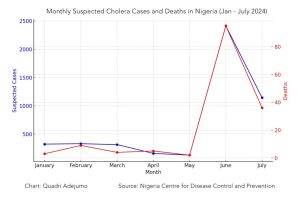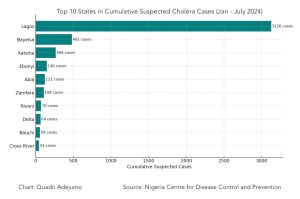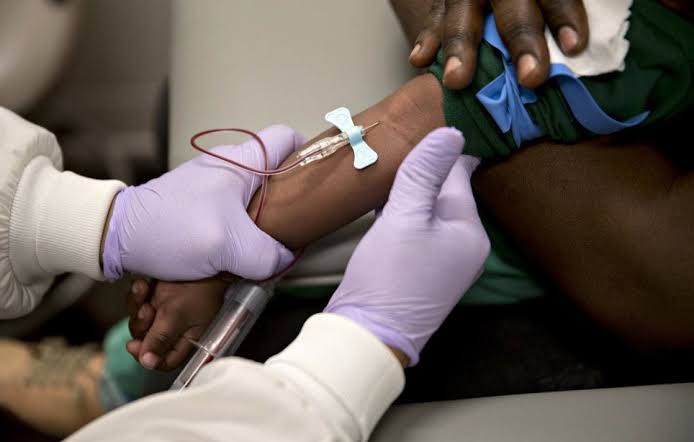By Quadri Adejumo
Habeeb prays for relief each day as the cold worsens. Living with sickle cell since birth, the 27-year-old faces a daily battle with rain and the cold it brings.
One of Nigeria’s many sickle cell warriors, Habeeb works as a barber in a small shop in Ibadan, Oyo State’s capital. “I won’t lie. I don’t like the rain. I don’t pray for it. It brings discomfort with the cold weather,” Habeeb says.
Nigeria holds the grim title of having the highest burden of sickle cell disease (SCD) worldwide, with 25% of its population carrying the sickle cell trait (SCT). For those like Habeeb, the stakes are particularly high as climate change introduces new health challenges.
The unpredictable cold spells brought on by changing weather patterns worsen the already precarious condition of SCD sufferers. “During the colder months, I frequently catch the flu, which triggers painful crises,” Habeeb explains.
Nigeria’s Sickle Cell Tally
Sickle cell disease (SCD) is an inherited, lifelong blood disorder characterized by deficient hemoglobin in red blood cells, which are responsible for carrying oxygen to the body’s tissues. The disease causes anemia, blood vessel blockages, and impacts millions worldwide, with 80% of cases occurring in sub-Saharan Africa.
Nigeria bears the heaviest burden, with 25% of its population carrying the sickle cell trait (SCT). Of the approximately 50 million people affected globally, between 4 and 6 million live in Nigeria. The World Health Organization (WHO) estimates that 150,000 SCD children are born annually in Nigeria, with a 20 per 1,000 live birth rate.
Sickled red blood cells, shaped abnormally like crescents, tend to stick together, obstructing blood vessels. These cells also have shorter lifespans than healthy red blood cells, leading to chronic anemia. Additionally, the sickled cells can damage the spleen, which filters waste from the blood, making individuals more susceptible to infections.
Other symptoms of SCD include pain crises caused by blocked blood flow, anemia, jaundice, and stroke. Acute chest syndrome, where sickling occurs in the lungs, can result from infections or dehydration and can be fatal.
Climate Change and Increased Illness
Due to climate change, Nigeria is experiencing more extreme weather patterns, with intense heat often followed by sudden cold spells. These shifts have led to a significant rise in cold and flu cases, which are particularly dangerous for sickle cell patients.
In Habeeb’s case, cold weather exacerbates his symptoms, making daily tasks daunting. “When it gets cold, I ensure my body is warm by wearing socks and long clothing that covers me entirely,” Habeeb shares. The cold triggers painful sickle cell crises, forcing Habeeb to take extra precautions just to get through the day.
For Habeeb, the impact extends beyond personal discomfort; it affects his livelihood. As a barber, his small shop is his lifeline, but on rainy days, he stays home to avoid the cold. “This prevents me from making money because I can’t go out during this weather,” he says. His reliance on weather forecasts is now a necessity, dictating when he can safely work.
The erratic weather also provides ideal breeding conditions for mosquitoes, the primary vectors of malaria. Increased moisture and humidity from rainfall lead to a rise in malaria cases, adding another layer of complexity to Habeeb’s life. “This period breeds malaria because of rainfall. I’ve had to take extra care due to malaria. It’s not encouraging for my health,” Habeeb adds.
Cold weather not only triggers sickle cell crises, but also weakens the immune system, making individuals more susceptible to malaria. For sickle cell patients like Habeeb, the risk of malaria is particularly high. “Genetically, sickle cell patients are more prone to malaria,” explains Dr. Ola Ibrahim, a medical doctor. “They lack the genetic protection against malaria infection.”
Dr. Ibrahim advises prompt treatment and regular check-ups to mitigate the impact of malaria.
Cholera as an Emerging Threat
As the rainy season progresses, Nigeria is battling a severe cholera outbreak. The Nigeria Centre for Disease Control and Prevention (NCDC) reports that as of July 21, 2024, there have been 4,809 suspected cases and 156 deaths across 35 states.
Compared to 2023, the number of suspected cholera cases has increased by 76%, with an 88% rise in the death toll.
In January, NCDC reported 322 suspected cases and 3 deaths, followed by 329 suspected cases and 9 deaths in February. March saw 314 suspected cases and 4 deaths, while April had 158 suspected cases and 5 deaths. May recorded 127 suspected cases and 2 deaths. However, June saw a dramatic surge with 2,415 suspected cases and 95 deaths, followed by 1,144 suspected cases and 36 deaths in July.


Eating contaminated food or drinking unhealthy water leads to acute diarrhea known as cholera, which, without immediate treatment, can result in fatal dehydration. For those with sickle cell, dehydration can trigger vaso-occlusive crises—painful events caused by blocked blood vessels. Dehydration from cholera can lead to severe health complications.
“Cholera poses a severe risk to sickle cell patients,” Dr. Ibrahim warns. “The dehydration caused by cholera can lead to incessant and extreme pain crises, complicating treatment and recovery.”
Dr. Ibrahim recommends drinking three to four liters of water daily. “Sickle cell patients are more susceptible to dehydration. When they lose water due to cholera, it affects them much faster than those without SCD. They need to stay well-hydrated.”
He emphasizes the importance of proper sanitation and swift medical attention. “Ensuring access to safe drinking water and food is crucial to preventing the spread of cholera.”
Heatwaves in Nigeria’s Climate Struggle
While cold weather is a known adversary, heatwaves pose an equally serious threat. Heatwaves increase the risk of dehydration, which thickens the blood and worsens sickling, leading to frequent and severe pain requiring medical intervention. In Nigeria, where reliable electricity is scarce, managing the heat becomes nearly impossible for sickle cell patients.
The cost of successive clinic visits, medications, and temperature control at home takes a heavy toll on families. Living in constant fear of the next health crisis adds to both the financial and emotional burden.
For Aisha, a 21-year-old sickle cell warrior, heat is a constant affliction. “The heat drains my energy. Some days, I can barely stand,” she says, describing the pain each heatwave brings.
During heatwaves, Aisha faces frequent hospitalizations. “I spend a lot on medications during the heat periods. Reliable electricity is hard to come by in this country,” she adds, explaining how the looming threat of a sickle cell crisis makes it difficult to focus on her studies.
Dr. Ibrahim cautions that heat creates a perfect storm of suffering for sickle cell patients. “Sickle cell patients are particularly vulnerable to extreme heat. We see an increase in hospital admissions during heat waves. Heat stress triggers sickling, which can lead to acute chest syndrome, stroke, and even death,” he says.
“Preventative measures are crucial. During extreme heat, patients need to cool off and stay hydrated.”
Championing Advocacy
Amid these challenges, some warriors find hope and resilience. Timilehin Ishola, a 22-year-old warrior, is leading millions of people with the same condition. “I want to help people like myself,” she says with determination.
She created the “Journey of a Sickle Cell Warrior,” a webpage where she shares her experiences and provides motivation for others. Her story serves as a beacon of hope for many facing similar battles. Through this platform, she has found a niche to express herself.
“I’ve had sickle cell all my life. I knew something was different even as a child. I was a special needs child, often absent from school due to frequent hospital admissions,” Timilehin shares.
“One thing that keeps me motivated is knowing I’m here for a reason. On days when I feel like giving up, I think about my advocacy journey and the people who look up to me. Knowing I inspire others through my sickle cell journey keeps me going.”
Through her advocacy, Timilehin aims to remind other sickle cell warriors that they are not alone. Her words resonate with countless individuals who see their struggles reflected in her narrative.
Government’s Response
There is an urgent need for the Nigerian government to ensure the population receives the necessary support. Experts are calling for policies and reforms to improve patient care. “We can’t discuss policies that will improve patient care without addressing regulatory reforms. The government should strengthen regulatory frameworks to ensure the quality and safety of healthcare services,” says Nneji Tobechukwu, a pharmacist.
Tobechukwu adds, “More governmental funds should be allocated to healthcare. The government should ensure healthcare is affordable and accessible to all. Prices for medications and medical procedures are rising, making it difficult for patients to afford their treatments.”
“Additionally, extensive public health campaigns and initiatives are needed to inform the public about the importance of regular medical check-ups, healthy lifestyle choices, and preventative care. Increased awareness is essential for better health outcomes.”
In response, the Nigerian government has unveiled a new clinical palliative plan aimed at improving access to medical services and easing citizens’ financial burdens. The initiative, launched by the Federal Capital Territory Administration (FCTA), provides free medical treatment, surgeries, and food supplies to patients.
Health and Social Welfare Minister Muhammad Pate emphasized the government’s commitment to further improving healthcare services.




